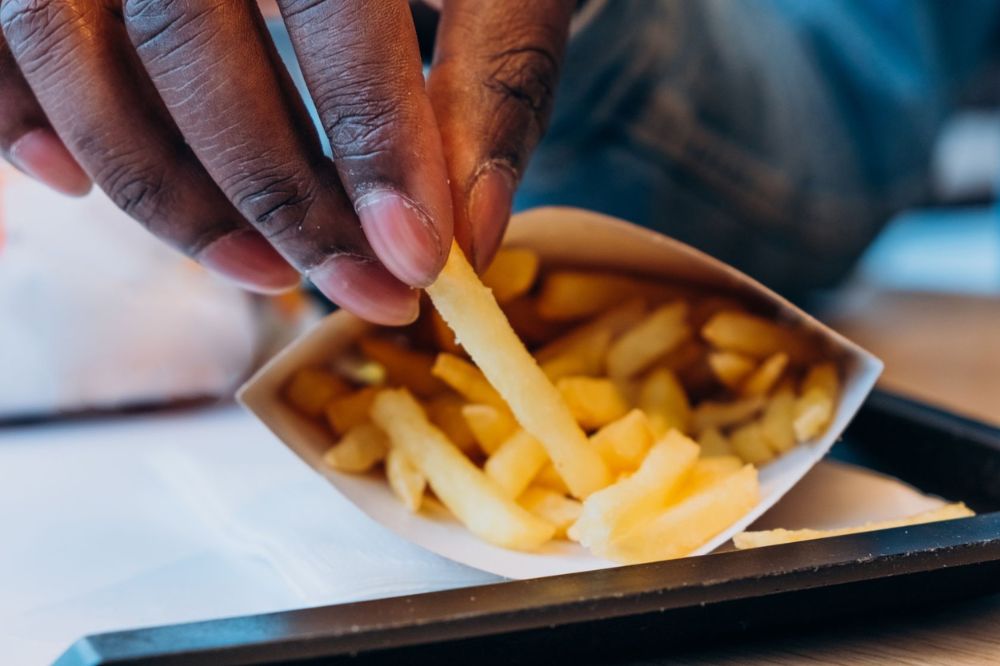You’re not alone
The first thing you should know is that this type of weight gain was very common. For example, the results of a survey of more than 800 adults in the U.K. showed that more than 63 % of respondents have found it “very” or “somewhat difficult” to manage their weight during the lockdown. Similarly, the American Psychological Association survey found that 61% of adults experienced undesired weight changes since the start of the pandemic, and more than 42% gained more weight than they intended.
It’s clear that just about every other person experienced some sort of weight issue because of lockdowns. You’re not alone in this. But it’s important to understand why it happened. There are two main reasons – eating more and moving less than usual. Let’s take a closer look at both to see what is behind these factors.

Emotional eating
One of the most common reasons why people start eating more is stress or anxiety. Being in a lockdown is stressful enough and when there’s a pandemic on top of that, our emotions can run really high. Many people are emotional eaters and use comfort food to deal with an overwhelm of negative emotions. A few too many chocolates, cakes, potato chips, and ice creams can really increase the overall calorie intake.
More snacking while bored
Being locked inside of your room, unable to socialize or do many of your hobbies, often results in boredom. Boredom is another common reason to reach for a snack. Research confirms that people tend to eat more when bored. These extra snacks and mindless crunching while watching TV can add a lot of calories too.

Difficulty making healthy food choices
Lockdowns are not great even if you have the intention to eat in a healthy way. Farmer’s markets were closed, frequent trips to grocery stores seemed risky, and comfort foods were that much more appealing than fresh veggies. Research shows that especially overweight people had a hard time sticking to a healthy way of eating. Reportedly, they were more likely to purchase chips and snacks, non-alcoholic beverages and order pizza or deep-fried foods more often than usual.
Drinking more alcohol
It’s not just food that helps us cope with stress and hardship. Enjoying a glass of wine or a cocktail in the evening can take the edge off just as well. It’s ok now and then but when the lockdowns stretched for months it led many to develop bad habits. A study from 2020 showed that 60 % of U.S. adults reported an increase in drinking alcohol due to the pandemic. Alcohol is yet another thing adding to increased calorie intake.

Sitting more
Increased intake of calories becomes even worse when energy expenditure drops. And that’s exactly what happened to many people too. More time at home equals to more time sitting. Sitting might not seem like a big deal but it has a significant effect. Here are three reasons why.
Sitting makes you burn fewer calories – All everyday non-exercise activities, such as standing, walking, or fidgeting burn calories. This energy expenditure is known as non-exercise activity thermogenesis and it’s a big part of your total energy expenditure. Sitting or lying down takes very little energy compared to the other activities and the total difference over every single day can be huge. Studies that compare people who spend their workday standing or walking show that they can burn up to 1,000 more calories per day than people with sedentary jobs.
Sitting increases your risk of weight gain – The fewer calories you burn, the more likely you are to gain weight. That’s why sedentary behaviour is closely linked to obesity. Studies show that people with obesity sit for an average of 2 hours longer each day than people with a normal weight. Now think how many more hours per day you were sitting because of the lockdown!
Sitting makes you prone to back pain – Sedentary lifestyle adds to weight gain and makes your abdominal and back muscles weak which puts an extra load on the spine. That’s why it is strongly linked to the development of back pain. This can create a vicious cycle where the back pain leads to less activity and that can further increase the weight gain and deterioration of the spine.

Fewer ways to exercise
Exercise can be a big help in maintaining a healthy weight. Unfortunately, almost all indoor exercise types such as swimming, yoga classes, or weight lifting were pretty much off-limits during lock downs. And even outdoor activities were substantially limited. Going for a group ride with your cycling buddies could be quite a hassle with all the required protection and regulations. We were left with exercising at home or going out alone to do some running or cycling away from people.
A study conducted by the University College London followed 70,000 people for more than 40 weeks starting March 2020. It found that 40% of participants reported doing less exercise. Many already struggle to get enough exercise every week without any restrictions. It’s no surprise that activity levels went down significantly during covid lockdowns. That’s another source of energy expenditure reduced or gone.
Weight gain is extra problematic now
We all know that weight gain is not a good thing, especially when it’s mostly in the form of body fat. Obesity can put people at heightened risk for type 2 diabetes, stroke, heart disease, hypertension, and a number of other health issues. This would be bad enough. But during the pandemic, obesity is an even greater concern. Carrying extra weight is an underlying condition that seems to put you at higher risk of developing a more severe case of COVID-19.
It’s more important than ever to manage your weight now and it seems harder than ever too. That’s why we will take a close look at all the tactics, strategies, tips, and tricks to help you get that extra weight off in our next article.




